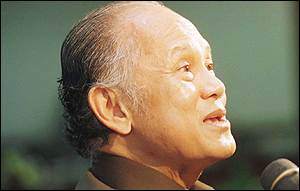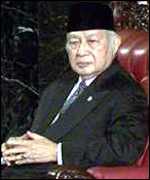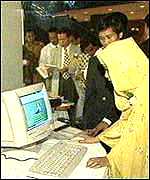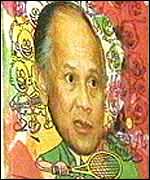BJ Habibie - profile of the
president

BJ Habibie: family friend of former President Suharto
Reports from Jakarta on the
controversial man who has become Indonesia's new President, BJ Habibie.
The appointment of Bacharuddin Jusuf Habibie as
Indonesia's Vice President in March was little more than
a formality. He had the endorsement of the country's
powerful armed forces and the dominant Golkar party.
At that point, it capped a remarkable rise to power for a
man who lacks the military background which has been
the key to success for most top Indonesian officials.
Mr Habibie was born on the island of Sulawesi in 1936.
In the 1950s his family got to know the current
President, Suharto, then a military officer posted to
Sulawesi, who took the aspiring engineer under his
wing.
"Leapfrog"
Mr Habibie went for further training in Germany, where he
became a director of a large aerospace company. It was
there that he thought up, what he called his leapfrog
theory of development, bypassing low-skill industries and
going straight to the high-technology stage:
"The basis of any modern economy is in their capability
of using their renewable human resources. The best
renewable human resources are those human resources
which are in a position to contribute to a product which
uses a mixture of high-tech."
 |
|
The theory convinced President Suharto. In the
mid-1970s he gave his
protege his own government
department and unlimited funds to build South East Asia's first aircraft industry.
National airliner is not selling
After starting by
manufacturing other
countries' aircraft under
licence, Mr Habibie embarked on his most |
ambitious project, the N250 - a wholly Indonesian
designed and manufactured airliner. Critics say it will never make money and they have not been reassured by
Mr Habibie's somewhat unorthodox economic justifications for the project:
"I have some figures which compare the cost of one kilo
of airplane compared to one kilo of rice. One kilo of airplane is thirty thousand US dollars and one kilo of rice
is seven cents and if you want to pay for your kilo of high-tech products with a kilo of rice, I don't think we
have enough."

Habibie now has his own website |
|
Mr Habibie's problem is that his planes have not sold
well. Indeed in an ironic twist, he has sometimes accepted rice instead of cash in order
to get a sale. The national
aircraft industry has been widely condemned as a waste of money and now it
has lost its government funding under the terms of the recent IMF aid package.
|
Some Indonesians felt he was the worst possible candidate for vice president including the
anti-Suharto campaigner, Mochtar Buchori: "He is a big spender. He also practices nepotism now."
National achievements
But Mr Habibie does have his admirers inside Indonesia.
His projects are always presented as national
achievements to the Indonesian public, and he has courted senior Islamic figures, an astute move in this
predominantly Muslim country.
Achmad Tirto Sudiro, leading member of the
Habibie-sponsored Islamic Intellectuals Association: "He
has now shown that he has the ability to achieve
something. When he came back to Indonesia, the president asked him, how much time do you need to set
up a plane factory and he said ten years. He started and was able to produce two to twelve. I am of the opinion
that he has the vision of how to build this country in the future."

Habibie when vice president
as seen by political cartoonist |
|
In the past Mr Habibie had always denied he had his
eye on the top job:
"No, to be frank. I am only
interested in the answer to where should I be to give the maximum contribution to my
society and the human race.
But I am sure that until my last minutes of being alive, I will always dedicate myself
to my society."
|
Under the rules of Indonesia's constitution, the vice
president takes over in the event of the president dying or leaving office. BJ Habibie is now the country's new
president.

|

